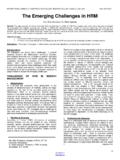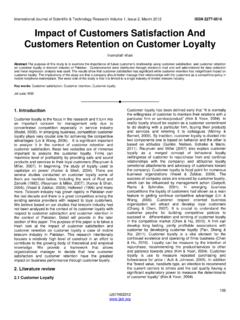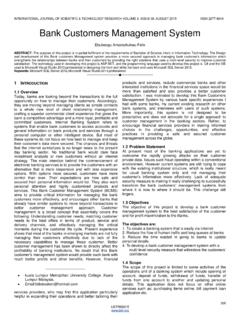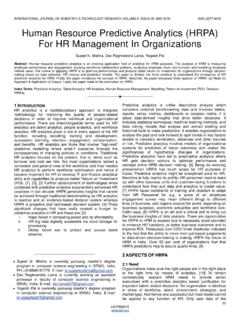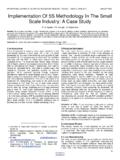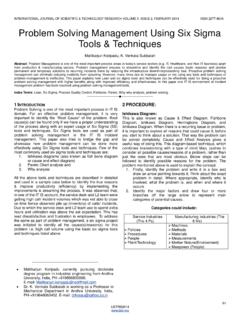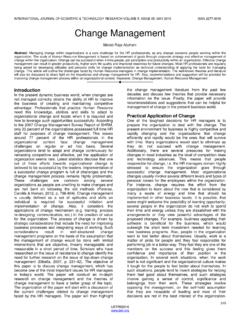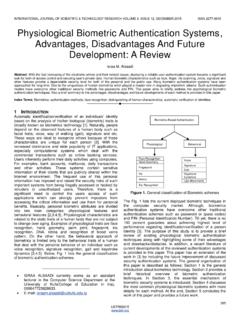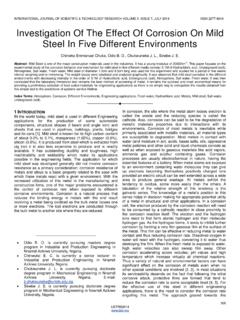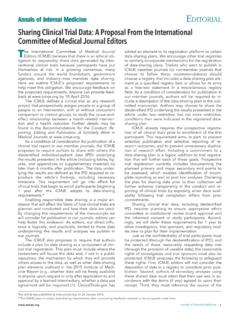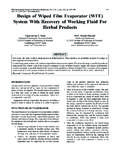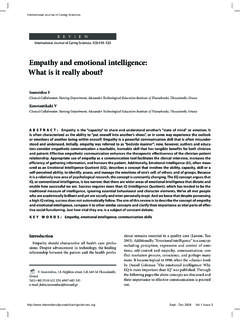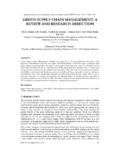Transcription of INTERNATIONAL JOURNAL OF SCIENTIFIC ... - …
1 INTERNATIONAL JOURNAL OF SCIENTIFIC & TECHNOLOGY RESEARCH VOLUME 4, ISSUE 04, APRIL 2015 ISSN 2277-8616 283 IJSTR 2015 Influence Business Environment On The Organization Performance Ridwan Ibrahim, Ina Primiana Abstract: The purpose of this study was to find solutions for problems related to the organization performance when connected with business environment. This study was theoretical review, especially about the effect of business environment on the organization performance. The results showed that business environment have a significant effect on organizatio performance.
2 Furthermore it was found that business environment has implication for organization performance. Keywords: business environment, organization performance Introduction: Indonesia puts the cooperative as a pillar of the national economy. Economic empowerment Indonesian through cooperatives are an integral part of national development, especially as the implementation of the principle of kinship (Article 33 of the 1945 Constitution). Economic empowerment through Cooperative, Micro, Small, and Medium Enterprises (SMEs) is intended to achieve three (3) things at once, namely (a) are directly related to an increase in pro-poor welfare, (b) support national economic growth (pro-growth), and (c) expansion of business opportunities and employment in order to reduce unemployment (pro-job) (Board.)
3 2012) Development approach aimed at economic actors, particularly in cooperatives and SMEs is essential to facilitate access to financial institutions. Poor people need quality financial services in a sustainable manner, such as savings, time deposits, loans, and various other micro financial services required. To achieve this mission, the Indonesian government and stakeholders to cooperate remove obstacles to the development of microfinance whose mother, as reflected in the White Paper for Indonesia Economic Policy.
4 During this lending to the poor constrained collateral requirements so that credit from banking institutions can not reach the low-income population. It is empirically proven in many countries that microfinance institutions managed to empower the poor, especially women (Cull, 2009). Financial services cooperative that grows in the pockets of the poor so far managed to bridge the obstacles to conducting a series of community-based economy, including by providing training and mentoring.
5 Cooperative financial services in Indonesia is one of the institutions of microfinance institutions that are legal entities that operate in the conventional cooperative (called the Credit Unions or KSP), as well as sharia (called Cooperative Financial Services Sharia or KJKS) which permits and supporting them by the Ministry of Cooperatives and other UKM. Institute which also gave the waiter in the form of savings and loan finance banking institutions whose licenses are issued by Bank Indonesia as well as NGOs and fostering license under the Ministry.
6 Although Indonesia has a wide range of providers of microfinance services, but the gap between demand and supply of microfinance services is still there. Most families in Indonesia do not have access to financial services, especially families living in rural areas and outside Java and Bali high number of poor communities. Problems of low access of the poor to microfinance cooperative services caused by the legal framework of microfinance is still limited, inadequate regulation and supervision, and is still applied "old paradigm" in the form of subsidized loans with a certain target that runs concurrently with the application of the "new paradigm "ie microfinance cooperative paradigm developed commercial and market-oriented.
7 Based on the pattern of presentation of general information obtained demonstrate the performance measurement and preparation of competitive strategy that is consistent with the formation of cooperatives in general and in particular the financial services cooperative basis of the comprehensive not done. Traditional measurement systems that are causing organizational weaknesses analysis and competitive advantage can not be done in depth (Kimando, et al, 2012). Therefore, a comprehensive approach in the assessment of the performance of the cooperative very needed, in particular by using the balanced scorecard (BSC).
8 Application of BSC concept is relevant to performance measurement as well as a competitive strategy and banking financial institutions (Zhang & Li, 2009). In a cooperative environment (in Indonesia) BSC is relatively new and still very minimal that implement it. Based on the value-added owned BSC, becomes the basis of Cooperatives and SMEs disseminate ministry to be applied to the cooperative, through technical assistance and training activities have introduced the concept of BSC to the cooperative.
9 From 2010 until 2013 (recorded) 1,500 administrators / supervisors / managers of cooperatives in Central Java Province, East Java, West Java, Riau, Jambi, West Sumatra, Kalimantan, South Kalimantan, NTB, NTT, Sulawesi, Bali, Bengkulu, and North Sumatra have followed guidance and training BSC (Ministry of Cooperatives and SMEs; 2014) Phenomena that arise from the development of the Cooperative Financial Services (KSP / KJKS) can not be separated from the phenomenon of local, national and even INTERNATIONAL in general affect the development of the cooperative itself.
10 As low performance achieved does not come by itself but rather the result of a decision-making process and the activities undertaken by the management (board, Supervisor, manager, and also includes members) KJK, and influenced by revolutionary trends that happened today such as: acceleration products and changes in technology, competition, degerulasi, demographic change, and tendency-a tendency towards public services and information. In the koptitif business environment, financial services cooperative management must have the ability to differentiate themselves in the competition in order to be able to survive this is in accordance with the statement of Peterson (2005) that the cooperative must have competitive advantage over other business organizations to be able to win in the competition.
